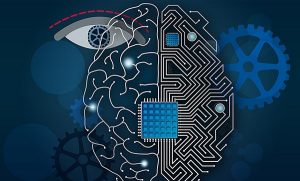PUBLISHED SEPTEMBER 2017
by Peter Brantley, Hypothes.is --

Peter Brantley
Over the past year, it’s been hard not to notice that artificial intelligence, or AI, seems to be everywhere in the news. It’s difficult to open up the
New York Times without reading at least one story that references AI. So, what is it? And what does it have to do with publishing?
At the heart of AI lies something called the Turing test, a philosophical convention posed by the British computer scientist Alan Turing in 1950. The Turing test suggests that machines demonstrate intelligence when they exhibit behavior equivalent to, or indistinguishable from, human reasoning. That’s a pretty tall order, because until recently computers have not had any way to learn things, nor any means of reasoning. But that’s beginning to change.
Through a set of computer routines called machine learning, computers can be taught that there are patterns in objects. For example, Google trained an early machine learning framework how to recognize cats by repetitively coaching the software, “This is a picture of a cat; this is another picture of a cat,” across millions of YouTube images. This process is called “seeding” the computer. Over time, the software, now called TensorFlow, was able to pick out even abstract images on its own. Google has made TensorFlow openly available, and it is now so widely used that even small development groups such as the one I lead are beginning to apply it.

When computer programs start to see patterns in images or words, they can start to make inferences about the nature of those patterns and associate them with things they already know. This is rapidly approaching the point of amazing. For example, in scholarly literature, there are early efforts to find patterns across vast numbers of research articles along the lines of, “A is often the result of B” and “B is often found with C,” enabling software to suggest that “C may indirectly yield A.” You can imagine the value of this in clinical research, enhancing our ability to find unexpected causes or cures for disease. In this way, machines are demonstrating a form of reasoning, albeit a limited one, that is beyond human capacity. That opportunity—to extend our own awareness—is an important motivator for AI.
Early computer voice recognition programs like Siri, or Amazon’s Alexa, are primitive AIs. As these programs become more sophisticated, they will begin to remember what you asked previously and anticipate things that you might want. For example, ask Alexa to describe an older film, and combined with its knowledge that you’ve read a book set in the same historical period, Alexa might be able to suggest a film coming out next month at your local theater covering the same events. It’s all about matching patterns.
You can begin to see the impacts that
AI might have for publishing. Being able to ask Siri, “What book should I read next?” and have it give you a really good answer is one way that AI is going to influence our industry. Already, publishers can assist this machine learning by embedding rich, descriptive metadata in their books and audiobooks, helping software find the patterns within the book. In this way, metadata “seeds” the computer. Perhaps even more eerily, as machines learn more about what kinds of tropes make a book popular with specific audiences, writing tools like Microsoft Word might be able to guide authors toward plot, structure, and characters in ways that enable them to better achieve their aims, whether the work is intended to be an entrant for the Booker Prize, or a popular HEA cyberpunk romance.
AI will also help us to understand what is selling best, through what distribution channel, and at what price. By seeding computers with increasing amounts of production, sales, and readership data, along with data about what else is happening in the world, publishers will be able to perceive patterns that we wouldn’t be able to spot otherwise. The growing ubiquity of AI suggests that publishers should acquire as much data as they can on workflows, sales, and readers, because otherwise internet giants like Amazon will wind up with a disproportionate understanding of what motivates readership.
Finally, I think one of the most exciting influences of AI will be on what we write, not just how. Already we’re seeing “chat bots” coach us through our interactions with hotel or airline booking systems, and we’ve seen how early efforts to embed augmented reality can enrich both books and games. It won’t be long before we can build interactive books that know something about us, and can condition their responses to our own. Weird, but cool.
Peter Brantley is the director of online strategy for the University of California Davis Library. Previously, he was the Director of Digital Development at New York Public Library, and, before that, the Director of Scholarly Communication at the open source not-for-profit, Hypothes.is. Brantley worked at the Internet Archive on policy issues and open standards and has managed technology groups at a variety of academic research libraries. He convenes a leading-edge publishing conference with the Frankfurt Book Fair called “Books in Browsers: The Edge of Storytelling.”